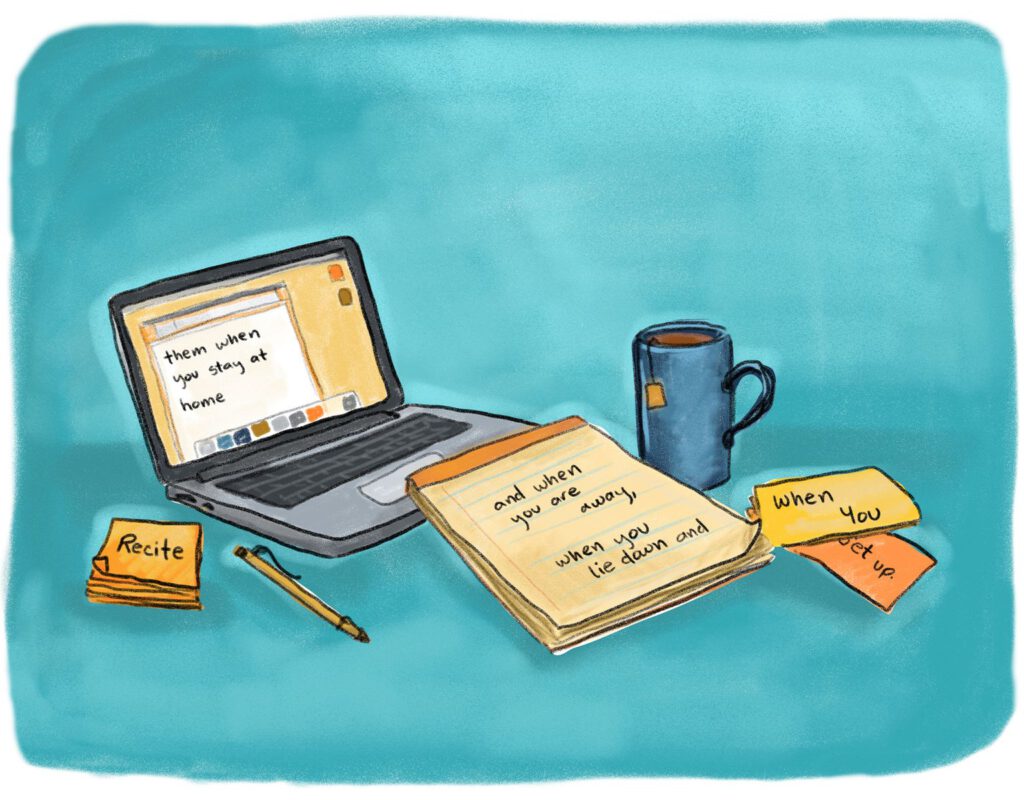What would it mean to us as Jewish educators, and to our students, if we made the mastery of Jewish texts more intentional? Relevant ideas, dilemmas, wisdom, and inspiration abound, but unless we ground them in Jewish texts that we master and make part of ourselves, our pedagogies and learning experiences are fleeting—thin rather than thick articulated expressions of our values—too general and undifferentiated to memorably and meaningfully bring alive our Jewish identity and connection. As American educators and program designers, we shy away from repetition and review, in favor of novelty and creativity. We are driven by mass marketing principles, looking to grab interest with what is new, different, colorful, and emotionally resonant. And while these are valuable ways to attract and hold the attention of the student, we should not forget that we are not only trying to attract them into the store but also to have them walk out having “purchased” something that they can keep. This requires regular reviewing of what has been learned, to the point of mastery. Mastery absorbing material so it lives within us, not within a book can be useful intellectually. (It’s convenient to know the blessings over food or the books of Tanach without having to look them up). Mastery can also lead to deeper thinking. We might encounter a point of view in a text and immediately think of another text that has a somewhat different perspective. The effort to reconcile those differences can lead to a more nuanced understanding. But the most powerful reason to master texts is because it creates a feeling of deep connection. The things we love, we love to talk about. And the things we constantly talk about, we come to love. In the words of Rabbi Shneur Zalman of Liadi, Jewish learning connects us to the “mind” of G-d and builds a deep and intimate spiritual bond. Ironically, we may find in the process that review and mastery are not the enemy of creativity and experiential richness—but rather that the two approaches complement each other: constraints inspire creativity and out-of-the-box and sensory experiences enhance memory and mastery. When program designers incorporate a text that is short enough and rich enough to revisit repeatedly over the course of an experiential program, to the point of fluent mastery of the text, we create a sense of deep ownership, belonging, and Jewish connection as the text begins to live within the learner.
Chazarah and Shinun: Reviewing To The Point of Mastery

Rotiman Chabad Center at Cornell University Ithaca, NY

Chana Silberstein.mp3
More PEDAGOGIES RESOURCES
A Pedagogy of the 48: Connecting Pirkei Avot, LIfe, and Learning
Dr. Gila Silverman
Director of Jewish Lifelong Learning
Siegel Lifelong Learning, Case Western Reserve University
This pedagogy invites participants to consider how the 48 different ways of “acquiring Torah” resonates with them
Access ResourceL’Shem Yichud: A Pedagogy For the Sake of Integration
Rabbi Jesse Paikin
Executive Director, Base
L’shem Yichud: For the Sake of Integration is a pedagogy based on an ancient practice of intention setting.
Access ResourceMachloket-i: A Personal, Professional Development Program
Edward Magiste
Educator
The Temple Tifereth Israel
Designed as a professional development strategy, this pedagogy of Machloket targets veteran educators asking to develop their teaching and ideas
Access ResourceLoving Goodness: A Pedagogy through Individuality and Belonging
Charles Herman
Former Executive Director & Founder
The Nesiya Institute
The pedagogy of Loving Goodness explores the tension between self-love and the love of the other
Access ResourceThe Pedagogy of Argument
Robbie Gringras
Co-Founder and Co-Director
For the Sake of Argument
The Pedagogy of Argument seeks to develop learners who are passionate about debates
Access ResourcePedagogy of Kinyan Torah: Helping Students Develop Their Own Interpretations of Torah
Ilana Gleicher Bloom
Founder of Mensch Academy at Mishkan Chicago,
Doctoral Candidate in Jewish Education, Coordinator of Pardes Experiential Educators Program
The pedagogy of Kinyan Torah helps educators support all learners to find their own unique Torah within themselves.
Access Resource